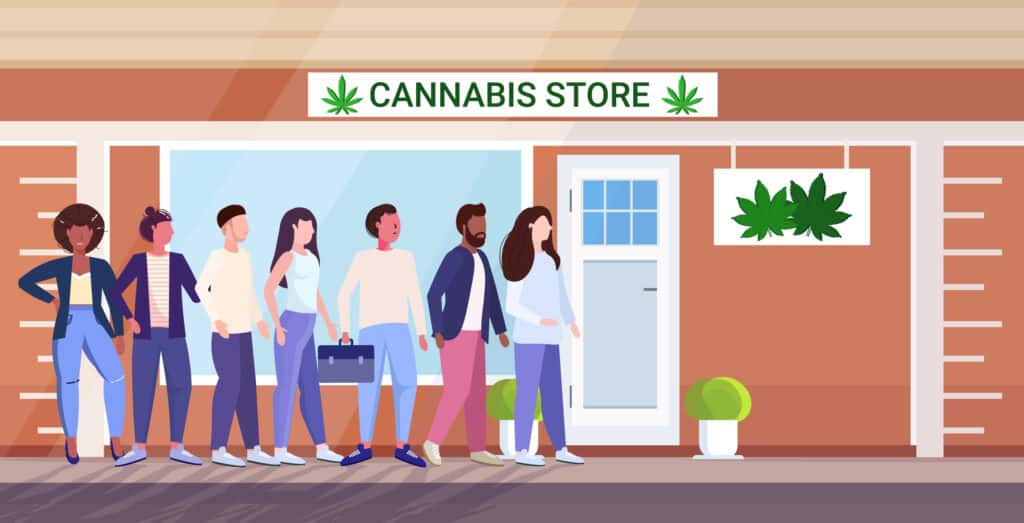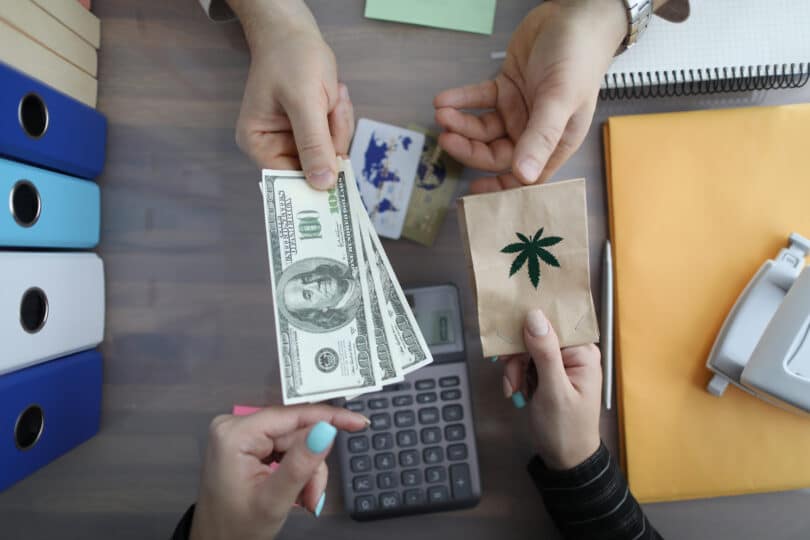Buying weed can be a very different experience depending on where you live. Some states are free game, you all you need is to be 21 years old with a valid ID. In other states, you may be required to have a medical marijuana recommendation from a licensed doctor in your area. And in 12 states, where cannabis is still completely prohibited, you’re stuck buying from a dealer. But are you really? In my quest to learn more about weed culture in whatever state I’m in, I’ve stumbled on quite a few stores using a legal loophole to sell real weed to consumers.
Buying weed from “dispensaries” in illegal states
Although logically, it would make sense to associate dispensaries with legal or medical states, it’s actually surprisingly easy to find stores that sell weed almost anywhere, even the remaining dozen states that don’t have any kind of cannabis legislation in the works. I will say that these stores are not exactly common, but if you know where to look, you can find dispensaries and apothecaries that sell real weed, out in the open.
What should you keep an eye out for? CBD/alternative cannabinoid stores that sell “THCA flower”. Although that may sound like another way to market sprayed/infused hemp buds with minor cannabinoids, it’s actually a really awesome loophole that allows stores to sell flower legally (sort of).

It’s a great option if you don’t have connections in the area, and even if you do, the prices are similar to what I pay for weed on the streets (slightly more, but a negligible difference). It also gives you the option of sorting through different lab tested strains as well as a variety of other products that you would find in real dispensaries, such as vapes, concentrates, and edibles.
Again, you have to do your research, because not all CBD stores carry flower products, but a growing number are starting to, as demand for high-quality buds consistently outpaces all other cannabis products (what can we say, most of us are old-school pot smokers). For the sake of not blowing up the spot, I won’t be naming any specific stores, but I will say that wherever you are in Indiana for instance, you can probably find a spot that sells THCA flower within a 90-mile radius.
What is THCA?
When it comes to weed products, most people are familiar with the primary compounds, THC in marijuana and CBD in hemp. But many are unfamiliar with THC’s precursor compound, THCA, or tetrahydrocannabinolic acid. THCA is only found in raw cannabis plants, but when heat is applied to the buds via smoking, vaping, or cooking, the THCA loses its carboxyl acid group (the A, at the end there), and becomes THC. This process is known as decarboxylation, or decarbing.
This is why, if you’ve ever paid close attention to the labels on your cannabis flower purchased from a legal dispensary, you will notice that most have THCA content listed, rather than just THC or including Delta 9 as the primary cannabinoid. So, it will say something like “26.10% THCA, 0.05% CBD, 0.27% Delta-9 THC”. As you can see, D9 is basically listed as a minor compound here, because in raw plants, there are only trace amounts of Delta 9. It’s all THCA before decarbing.
But the thing about THCA is, on its own, it does not get you high, so if extracted from raw plant material, it can be used therapeutically and without any psychoactive effects. By itself, THCA has the chemical formula C22H30O4. After decarbing, it loses that acid group, becomes delta-9 THC with the formula C21H30O2. As you can tell by the formulas, they are closely related, but still different. And in chemistry, minor differences can translate to major changes in effects.
The THCA loophole
Who doesn’t love a good loophole? They provide us a way to skirt the law without actually breaking it, by taking advantage of non-specific regulations or gaps and inconsistencies in how the law is written. Some loopholes are true loopholes that couldn’t be challenged in court, others are theories and ideas that make their way through industries, and because it’s not something that is truly harming people, will go unchecked by regulators. But which is it in the case of THCA?
First, you’ll have to understand how cannabis is legally classified in the US. Cannabis is broken down into two categories: “marijuana” which is higher in THC, and “hemp” with has very little THC but is high in CBD and other minor cannabinoids. The cutoff between these two categories is 0.3% THC content on a dry weight basis, so any plants containing more than that are marijuana, and less that that would be classified as hemp. This designation opens the door for the THCA loophole, because since the testing typically comes back with less than 0.3% delta-9 THC, stores are advertising these flower strains as “hemp flower”.
Is it really a loophole, though?
So, here’s the thing… the THCA loophole offers a workaround for the sale and purchase of cannabis flower, but does it provide protection to consumers from legal trouble? Probably not. Should you get pulled over with a jar of THCA flower, the only way you’ll get to keep it is if you happen to come across an extremely lenient police officer, which is highly unlikely.
Take the disclaimer on the jar of flower I bought from a dispensary here in Indiana: “Buy and consume at your own risk. Although this is legal hemp, please act responsibly. We are not responsible for anyone confiscating this hemp, nor arresting or fining you for having this legal hemp product in your possession because of a misunderstanding of what it is.”
It’s a little wordy, but definitely drives the point home that just because this is categorized as a hemp product, that doesn’t mean you won’t get in trouble for having it. Not to mention, many states have total THC requirements on hemp products which, most legal experts agree, would categorically include THCA as well, making all products containing them still illegal.
Additionally, regardless of what the law actually states, persuading law enforcement or a court that these products are legal when they are likely not too familiar with the nuances of federal hemp laws, is going to be an uphill battle. You would have to be able to convince them that your items are permissible because of a gap in testing and labeling requirements under the 2018 farm bill; and let me tell you, after my experience getting alternative cannabinoid products confiscated in Kansas, that’s not an easy sell. This is an issue that would likely need to be resolved in the appellate courts, which would be expensive, time consuming, and risky.
What the DEA has to say about THCA
Interestingly, the DEA hasn’t said very much about THCA, at least not in any official capacity. While they haven’t made any direct statements to address the legality of THCA, they did post a short letter in response to a Reddit comment, claiming that delta-8 THC and THC-hexyl are considered tetrahydrocannabinols; and are illegal if not hemp-derived, over the THC limit, or made with synthetic processing.
The comment was first reported by Marijuana Moment, but as of then, the FDA has not responded for additional comments. That being said, the letter was written by DEA Drug and Chemical Evaluation Section Chief, Terrence Boos. He clarified that when accounting for THC, they look at a “total THC” amount, which refers to the amount of any THC in a product after decarboxylation. So when it comes to THCA, because it turns into delta-9 THC after heat is applied, it still counts. Even if a plant has less than 0.3% delta 9 at harvest, it doesn’t matter if after heating, that amount rises to above the 0.3% cutoff.
Boos states: “Accordingly, cannabis-derived delta-9-THCA does not meet the definition of hemp under the CSA because upon conversion for identification purposes as required by Congress, it is equivalent to delta-9-THC.”
Final thoughts
So, if you’d like to buy some weed from a store like most of the nation is allowed to, my advice is to do a bit of research to find what stores are selling THCA weed in your area. You might be surprised at what you find. That being said, just because you purchased it legally, does not mean that you won’t get hassled by police for having it, since they likely won’t see the THCA loophole as clearly as we do.
Hello readers. We’re happy to have you with us at Cannadelics.com; a news source here to bring you the best in independent reporting for the growing cannabis and hallucinogen fields. Join us frequently to stay on top of everything, and subscribe to our Cannadelics Weekly Newsletter, for updates straight to your email. Check out some awesome promos for cannabis buds, smoking devices and equipment like vapes, edibles, cannabinoid compounds, amanita mushroom products, and a whole bunch more. Let’s all get stoned together!









